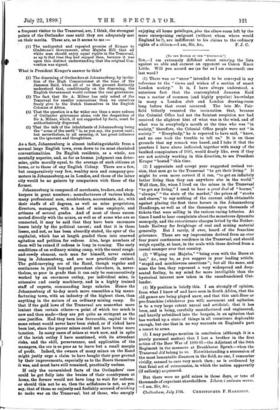LTO THE EDITOR OP TER " SPECTATOR
SIE,—I am extremely diffident about entering the lists against so able and earnest an opponent as Canon Knox Little. Will you accord me (as far as I am concerned) one last word ?
(1) There was no "sneer" intended to be conveyed in my reference to the "views and wishes of a section of smart
London society." It is, I have always understood, a notorious fact that the contemplated Jameson Raid was a matter of common (and highly popular) knowledge in many a London club and London drawing-room
long before that event occurred. The late Mr. Fair- field bitterly resented the insinuation that, because the Colonial Office had not the faintest suspicion nor had
received the slightest hint of what was in the wind, and of what was in everybody's mouth at the time who was "in society," therefore, the Colonial Office people were not "in
society." "Everybody," he is reported to have said, " knew, and no one took the trouble to tell us." It is on these
grounds that my remark was based, and I take it that the quarters I have above indicated, together with many of the baulked conspirators of 1895, would dearly like, even if they are not actively working in this direction, to see President Kruger " bested" this time.
(2) I appreciate and accept your suggested revised ver- sion, that men go to the Transvaal "to get their living." It might be even more correct if it ran, "to get an infinitely
better living than they can anywhere else in the world." Well then, Sir, when I lived on the mines in the Transvaal
"to get my living," I used to hear a great deal of "booms," "slumps," "the state of the market," the prices of "stocks and shares," to say nothing of the current odds obtainable against placing the first three horses in the Johannesburg Handicaps, as well as of the thousands upon thousands of tickets that were selling in the various racing lotteries. At times I used to hear complaints about the monstrous dynamite
monopoly, and the extortionate charges levied by the Nether- lands Railway for freightage of coal and mining material
generally. But I rarely, if ever, heard of the franchise grievance. These are my impressions derived from an over four years' continuous residence in the Transvaal, and should weigh equally, at least, in the scale with those derived from a casual scamper over that country.
(3) "Wiping out Majuba," "being even with the Boers at last," &c., may be, as you suggest in your leading article, "stupid and mischievous assertions "; but all the same, and none the less, they represent a very widespread and deep- seated feeling, to my mind far more intelligible than the hysterical interest now taken in the unenfranchised Out- lander.
(4) My position is briefly this. I am strongly of opinion, from what I know of and have seen in South Africa, that the old games are being played anew, and that this anti-Boer or pro-franchise (whichever you will) movement and agitation is to a very large extent unreal and artificial; that it has been, and is being, carefully manufactured and engineered, and heavily subsidised into the bargain, in an agitation that has worked up a state of things in all conscience deplorable enough, but one that in no way warrants on England's part a resort to arms.
(5) I may perhaps mention in conclusion (although it is a purely personal matter) that I lost a brother in the first action of the Boer War of 1880-81—the Adjutant of the 94th Regiment in the massacre at Bronkhorst Spruit—when the Transvaal did belong to Us. Notwithstanding a succession of the moat lamentable disasters in the field, no one, I remember
vividly, seemed to care very much then ; as is evidenced by that fatal act of retrocession, in which the nation apparently (if sullenly) acquiesced.
But there were no gold mines in those days, or tens of thousands of expectant shareholders. Libera:i animam means. —I am, Sir, &c.,
Cheltenham, July 17th. CHRISTOPHER F. HARRISON.


































 Previous page
Previous page